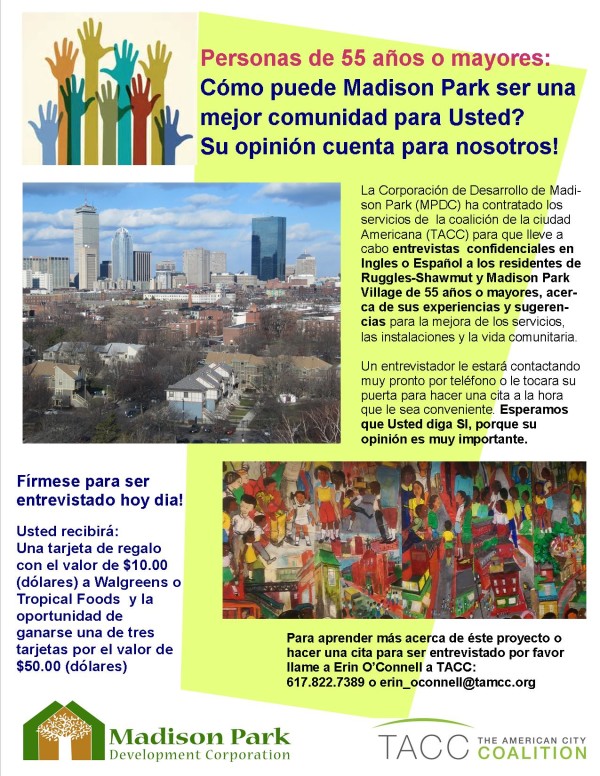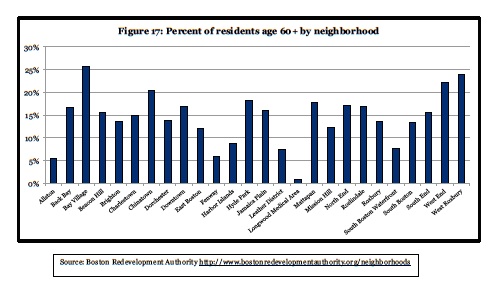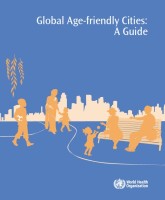Aging in Place: Understanding and Meeting the Housing Needs of Older Lower-Income Residents
 As a social scientist, I focus on using research to inform, evaluate, and develop data-driven strategies to improve well-being and quality of life for low-income individuals, families, and communities. At the request of Madison Park Development Corporation (MPDC), I am currently leading an interdisciplinary team of researchers and surveyors to assess the supportive service needs of 320 older residents (ages 55 and older) in Madison Park Village, a subsidized housing community in the Dudley Square neighborhood of Roxbury.
As a social scientist, I focus on using research to inform, evaluate, and develop data-driven strategies to improve well-being and quality of life for low-income individuals, families, and communities. At the request of Madison Park Development Corporation (MPDC), I am currently leading an interdisciplinary team of researchers and surveyors to assess the supportive service needs of 320 older residents (ages 55 and older) in Madison Park Village, a subsidized housing community in the Dudley Square neighborhood of Roxbury.
Our team of bilingual surveyors engages directly with residents in confidential one-on-one interviews to learn about their experiences and suggestions for improving services, facilities, and community life. This direct feedback will allow us to give MPDC a candid look at seniors’ lives and the supports they may need successfully age in place. To gain a comprehensive view of the residents’ experiences and needs, the survey covers the following key indicators:
- Resource and service utilization and needs
- Housing and neighborhood
- Social environment and connectedness
- Physical and mental health
- Food security
- Demographic information
By including multiple national indicators, we will be able to compare Madison Park seniors to seniors in other communities and national norms. This data will also assist MPDC and other stakeholders in bringing additional resources and services to the community. The timing is right, as MPDC is planning for physical upgrades and spatial redesign work in the community. The needs assessment will better ensure the space is designed to meet this population’s needs. By providing the right combination of services and physical space, hopefully, more Madison Park residents will remain independent in their apartments in Lower Roxbury.
The assessment will also be integrated into the Whittier Street Choice Neighborhood planning process, providing baseline information on the housing, health, employment, and community needs of this older group of residents.
 At Madison Park Village, we are learning from seniors as we strengthen and build strategies to promote housing stability and health among this growing demographic group. While the population of Boston is still relatively young compared to other major metropolitan areas, Boston is aging. In 2010, more than 14% or 88,000 of Boston’s residents were 60 years or older; by 2030, the older population is projected to reach 130,000.
At Madison Park Village, we are learning from seniors as we strengthen and build strategies to promote housing stability and health among this growing demographic group. While the population of Boston is still relatively young compared to other major metropolitan areas, Boston is aging. In 2010, more than 14% or 88,000 of Boston’s residents were 60 years or older; by 2030, the older population is projected to reach 130,000.
Like MPDC, the City of Boston is taking a closer look at how to meet current and future need. In Spring 2014, the City released the Aging in Boston Report. As Mayor Walsh writes, “The data collected for this report will help us understand the full range of challenges our seniors face, so that we can provide the right solutions to meet their needs. This data will also show that our population of elders is growing, and we need to do a better job of connecting them–not only with each other, but with essential services.”
Boston also recently joined the World Health Organization’s Friendly City Network. The press release states:
 Today Mayor Walsh also announced that the City of Boston will join the World Health Organization’s Age Friendly Cities Network to better prepare Boston for the growth in the over 60 population. In joining the network, Boston makes a commitment to create environments that promote healthy and active aging and a good quality of life for older residents. Over the next five years, the City will work with partners to assess its “age friendliness,” and then create and implement a three-year action plan.
Today Mayor Walsh also announced that the City of Boston will join the World Health Organization’s Age Friendly Cities Network to better prepare Boston for the growth in the over 60 population. In joining the network, Boston makes a commitment to create environments that promote healthy and active aging and a good quality of life for older residents. Over the next five years, the City will work with partners to assess its “age friendliness,” and then create and implement a three-year action plan.
I am interested in learning more about the international WHO standards at Building Age-Friendly Communities: The Summit on March 18. The conference will also look at local issues including the Massachusetts Healthy Aging Data Report. Additional information and registration for this free conference supported by Tufts Health Plan Foundation in partnership with The Boston Foundation is available here.
I’ll report back on new ideas sparked at the conference.
ABOUT ALEXANDRA CURLEY, SENIOR ASSOCIATE, TACC: Alex brings more than a decade of experience researching urban poverty, public and mixed-income housing, as well as supportive services programs focused on the well being of lower-income communities in the United States and Europe. She is a specialist in the program evaluation of large-scale governmental initiatives such as HOPE VI and Choice Neighborhoods. By carefully synthesizing large quantities of information and utilizing user-friendly formats, she places a high priority on making findings accessible to all. At TACC, Alex develops and implements resident and community needs assessments in mixed-income communities such as Oak Hill Apartments in Pittsburgh, PA and high-poverty public housing projects such as Manton Heights in Providence, RI. She assessed and wrote the article, “Driving Quality of Life in Mixed-Income Communities,” on the quality of life management practice at Harbor Point in Dorchester, MA (see Journal of Housing and Community Development, May/June 2013).
Alex has worked with the Urban Institute, the Dukakis Center for Urban and Regional Policy at Northeastern University, as well as the OTB Research Institute for Housing and the Urban Mobility Studies in the Netherlands. She holds an undergraduate degree from Northeastern and a Ph.D. in Sociology from Boston University.
You can reach Alex by email at alex_curley@tamcc.org.